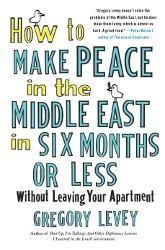 Peace in the Middle East is a big topic. And something that I care greatly about. But ask me to articulate an opinion that’s deeper than “I believe Israel has the right to exist with secure and recognized borders” (thank you Hillel for giving me a sound bite that I’ve been using since I was 20) and I’ll give you a blank look. It’s not that I don’t care, it’s just that I’d rather read the umm…fluffier pages of the newspaper when it comes to this stuff (or anything else having to do with politics for that matter*). So when I was given the chance to read Gregory Levey’s How to Make Peace in the Middle East in Six Months Or Less Without Leaving Your Apartment (Free Press; September 2010; $25.00), I thought to myself, “finally, a book about all of this that’s written for me.”
Peace in the Middle East is a big topic. And something that I care greatly about. But ask me to articulate an opinion that’s deeper than “I believe Israel has the right to exist with secure and recognized borders” (thank you Hillel for giving me a sound bite that I’ve been using since I was 20) and I’ll give you a blank look. It’s not that I don’t care, it’s just that I’d rather read the umm…fluffier pages of the newspaper when it comes to this stuff (or anything else having to do with politics for that matter*). So when I was given the chance to read Gregory Levey’s How to Make Peace in the Middle East in Six Months Or Less Without Leaving Your Apartment (Free Press; September 2010; $25.00), I thought to myself, “finally, a book about all of this that’s written for me.”
Levey is the author of Shut Up, I’m Talking: And Other Diplomacy Lessons I Learned in the Israel Government (Free Press Paperback; August 2010; $15.00) is hilarious *and* now available in a paperback. Levey’s first book chronicles his stint as a speechwriter for the Israeli delegation to the UN and later as a speechwriter for Prime Minister Ariel Sharon.
How to Make Peace picks up where Shut Up leaves off: Levey is back home in North America and has left the balagan that is the Middle East Conflict. Or so he thought. Unfortunately for him, he had “unwillingly developed an area of expertise” so when he decided to work as a journalist, everybody wanted him to write about the Middle East. The more he was published, the more often random laypeople approached him with their own ideas:
Everyone I encountered – whether they fell on the right among the hawks or on the left among the doves, whether they were Jew, non-Jew, or Arab – seemed sure that if they were just given six months and the authority, they could solve the Middle East conflict once and for all. Probably without leaving their armchairs, or taking a break from yelling at CNN.
Since he was almost an expert, Levey figured he could at least make an attempt. So he did what most of us would do in the situation. He announced his intentions to “delve into freelance diplomacy” on his Facebook page with a status message. From that moment on, Levey sets about in earnest to make peace. He reaches out to his old contacts to try to get appointments at the White House (the recounting of his slightly stalkerish moves are hilarious), pro-Israel groups on both ends of the spectrum (we witness J Street’s birth) and even his neighborhood grocer (who’s either Palestinian or Mexican).
With a storyline that involves PeaceMaker boxers and chapter titles like “The Israel Lobby and the Perfect Avocado” and “With All Due Respect, You Must Be on Crack,” How to Make Peace will have you pee-your-pants laughing (or, at least Sprite-out-your-nose laughing).
You don’t have to finish the book to know that Levey doesn’t end up succeeding in his endeavor. (Even if his Author’s Note says he doesn’t “want to give anything away” and that “[y]ou’ll have to read [the] whole book if you want to find out.”) And, as funny as How to Make Peace is, Levey points out that that it’s “the comic details that best reflect the gravity of the larger picture.” The book is his own perspective into a very tough, very complicated subject. Which, as he points out, is “all any of us can hope to [give].”
Was How to Make Peace as fluffy and funny as I could hope for? Absolutely. Did it also surprise me in how insightful it was at the same time? Yes! Should you go get yourself a copy, read it and then come back here to tell me what you think? Yes, Yes and Yes!
———————————————————————————
In accordance with the Federal Trade Commission’s 16 CFR, Part 255: “Guides Concerning the Use of Endorsements and Testimonials in Advertising,” I’m letting you know that just because I got to preview the books for free doesn’t mean I’m obligated to give it a favorable review. I’m doing that all on my own.
*Shhh! I can almost hear you arguing at me across the computer saying things like “what?! You don’t care about x, y or z topic?!” Don’t worry – I’m marrying an Israeli in a year and I’m sure that a year after that I’ll have very strong opinions on everything (including politics) and won’t be afraid to argue passionately about them. But that’s a post for another time.


1 comment